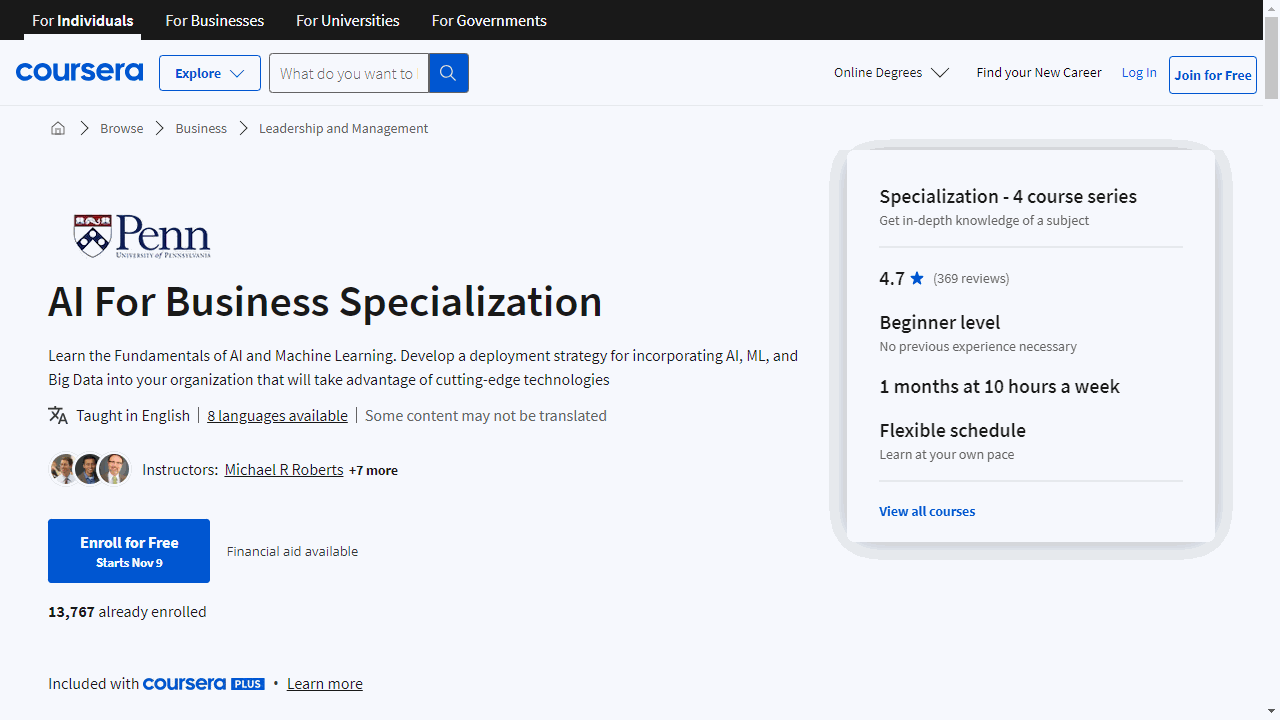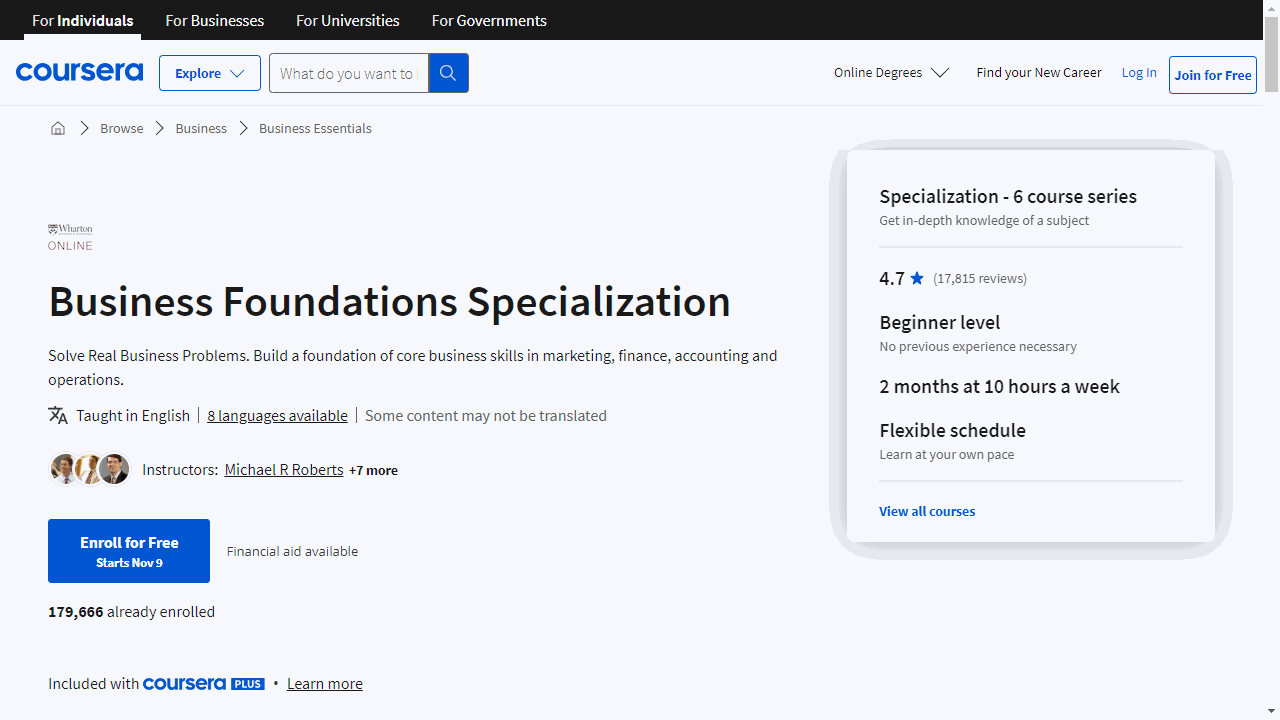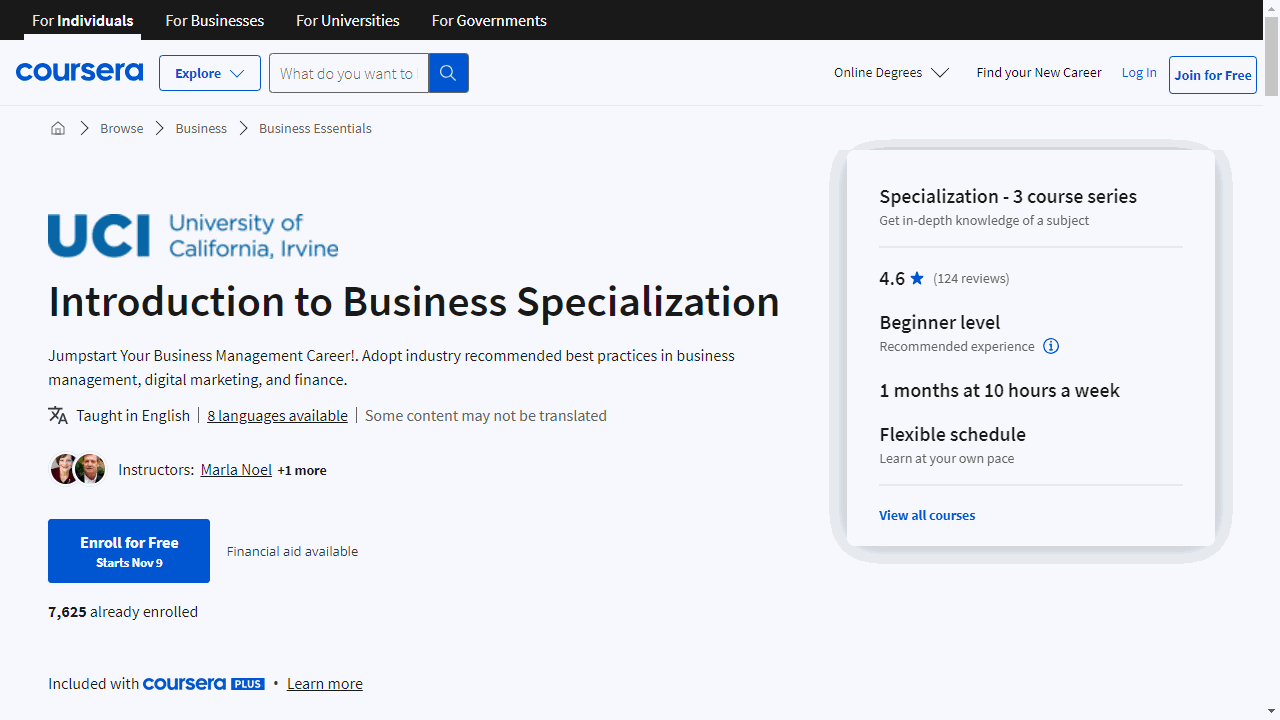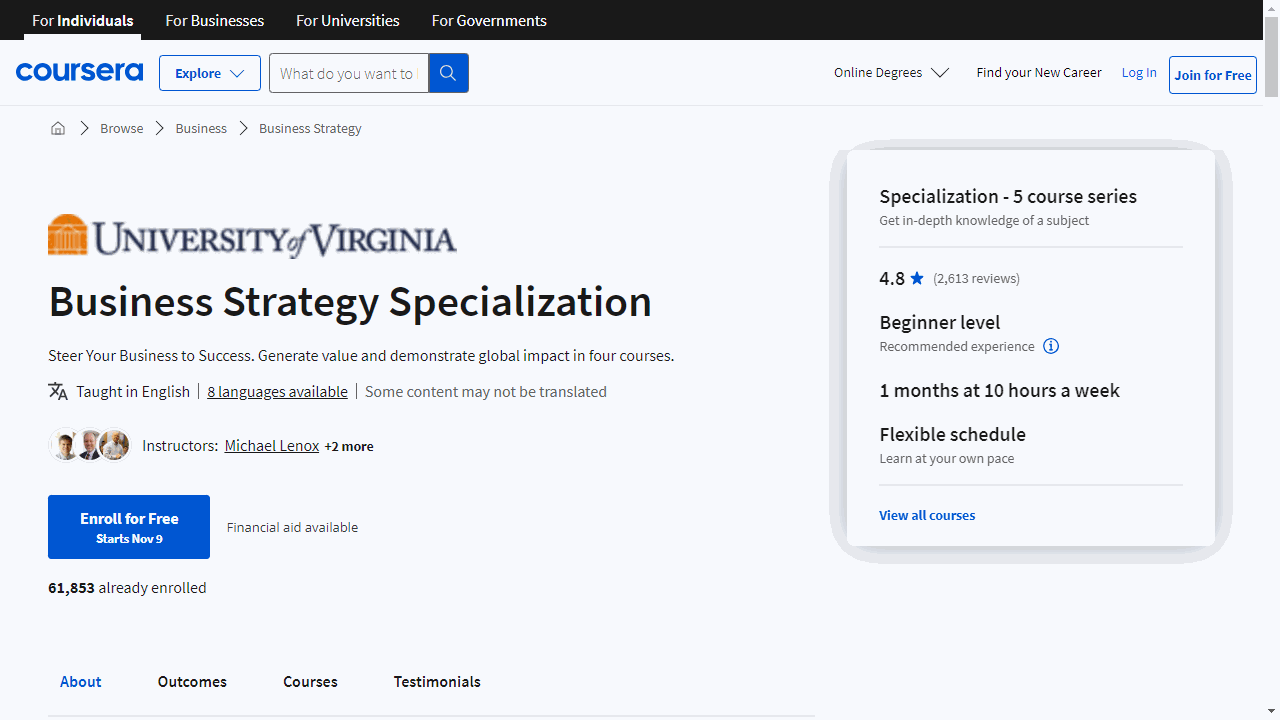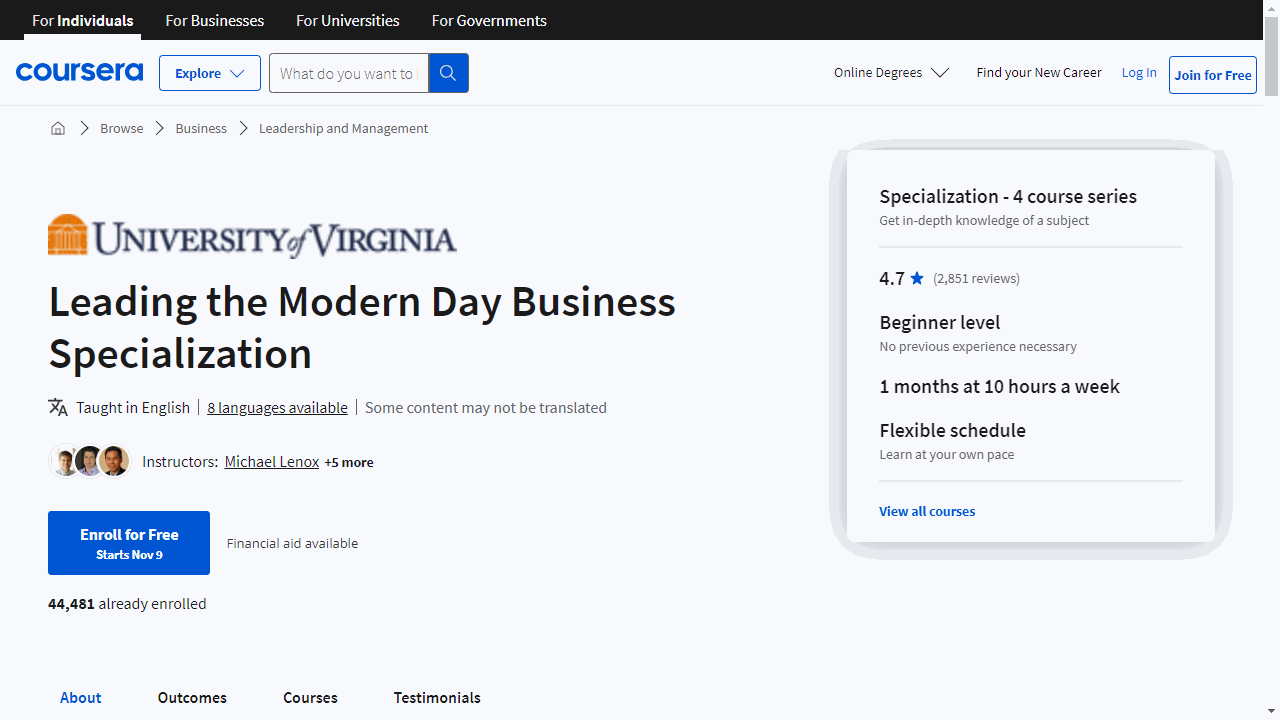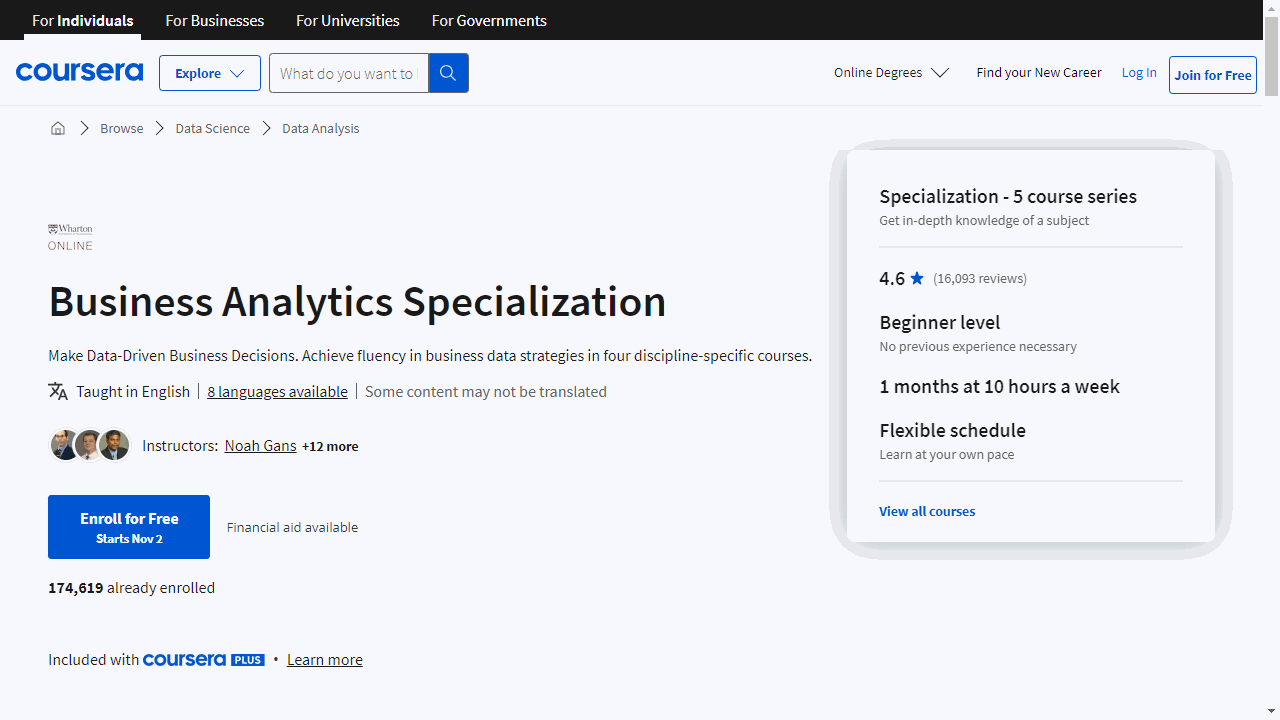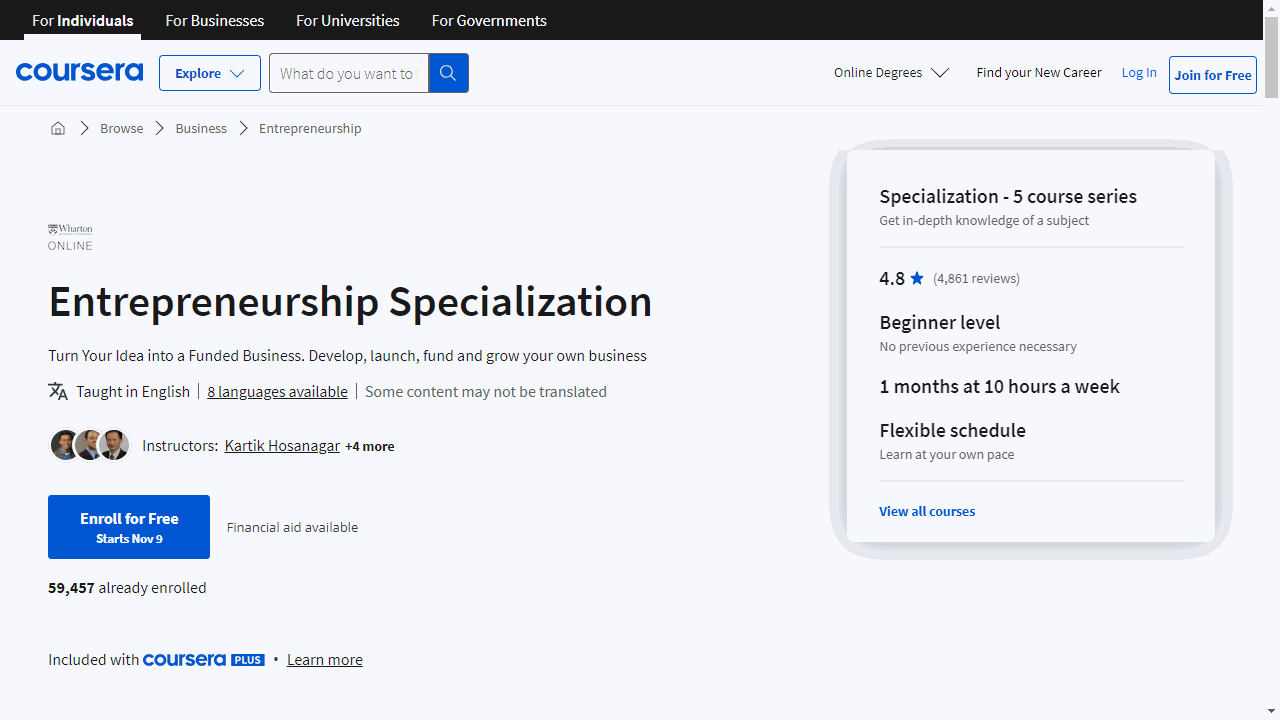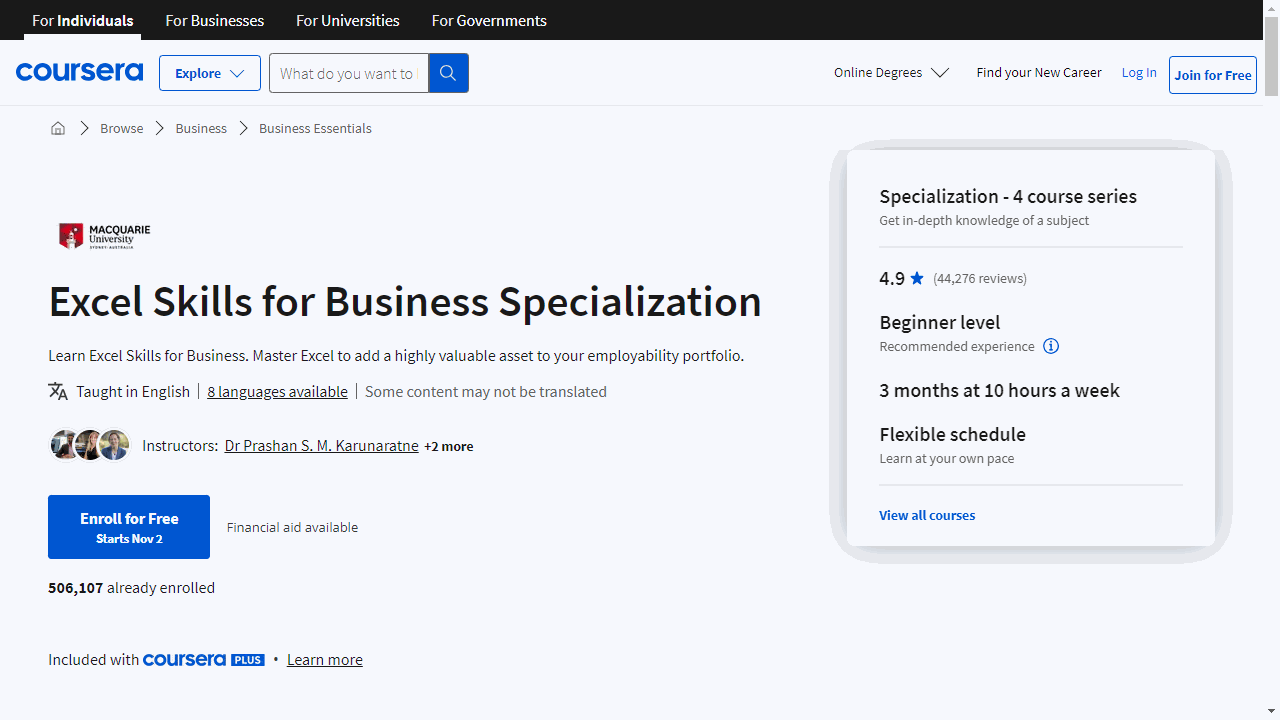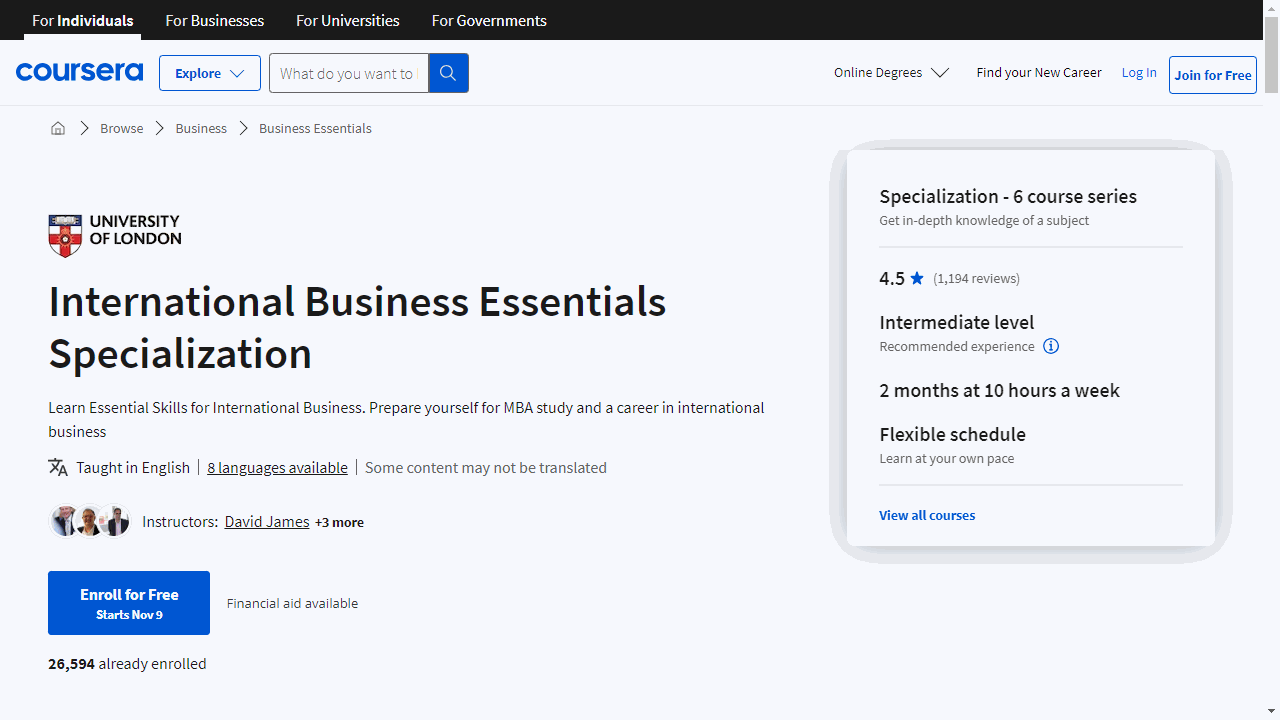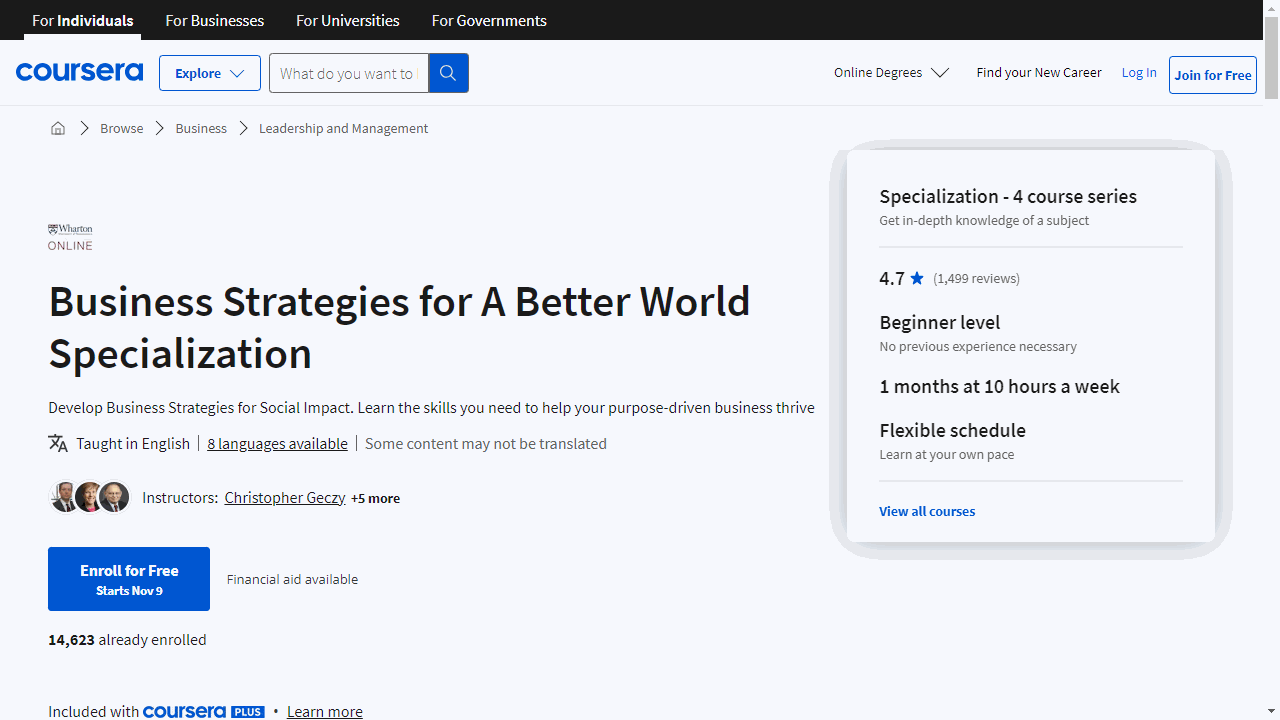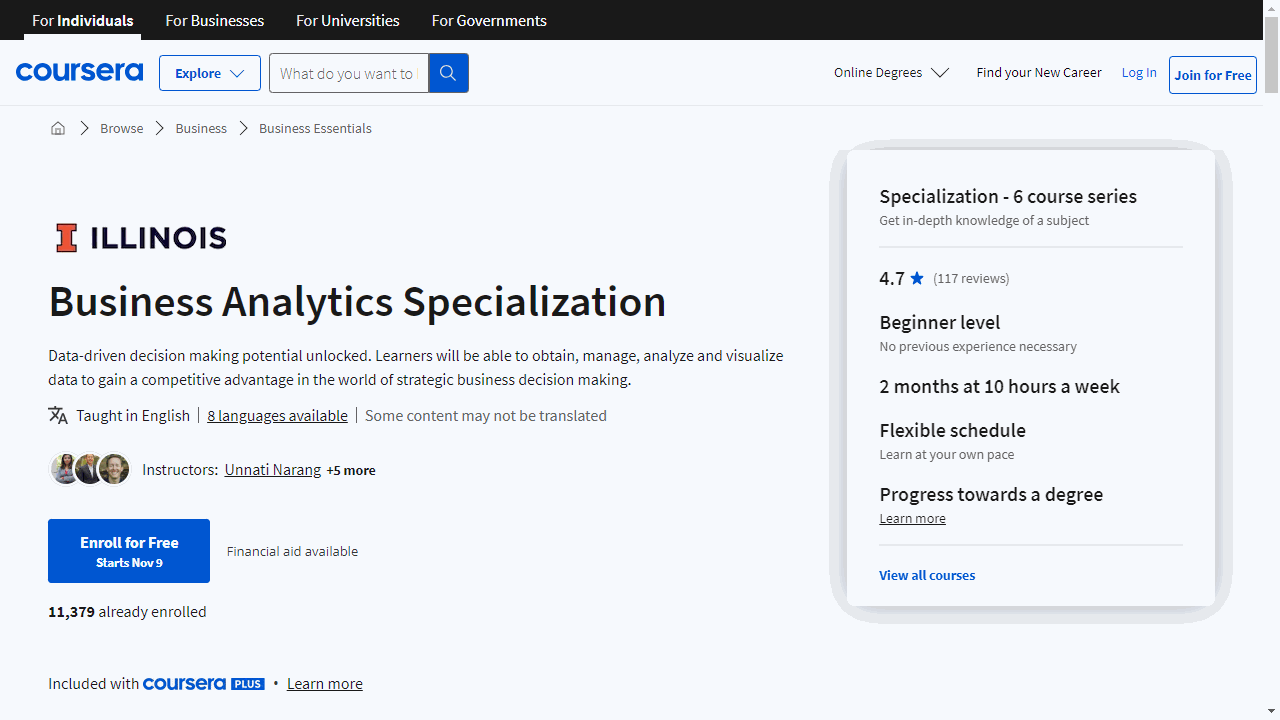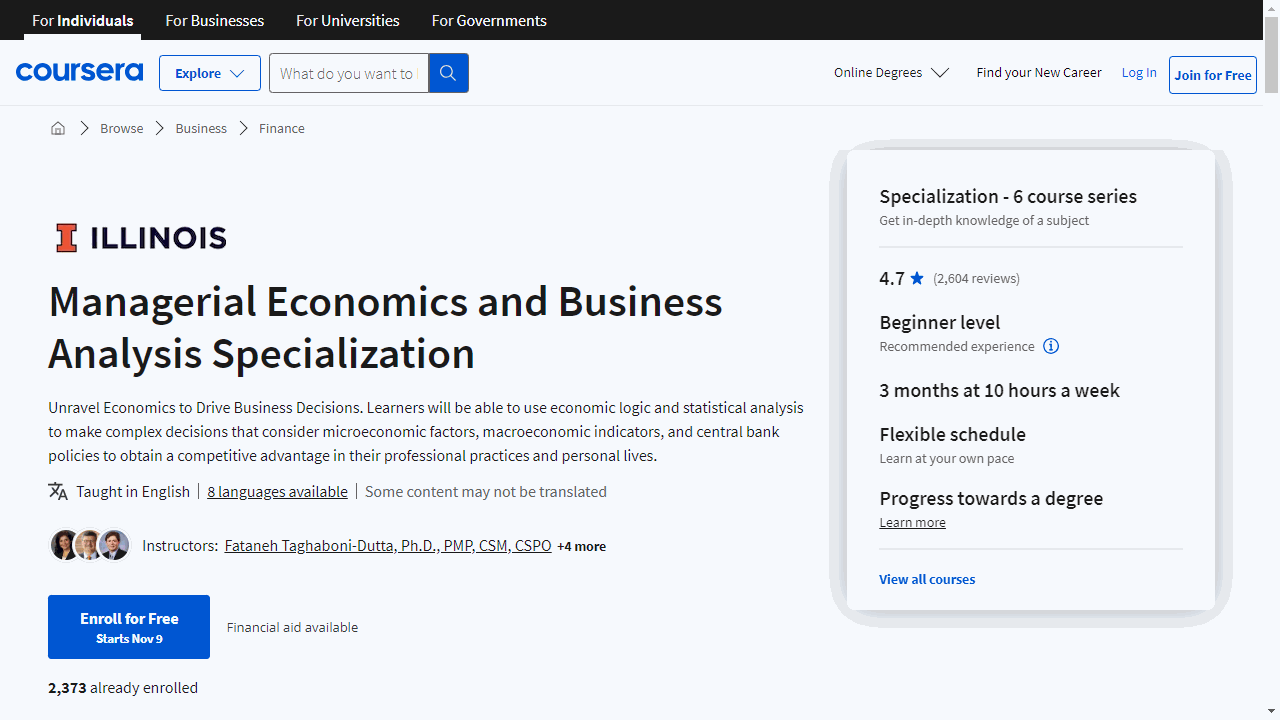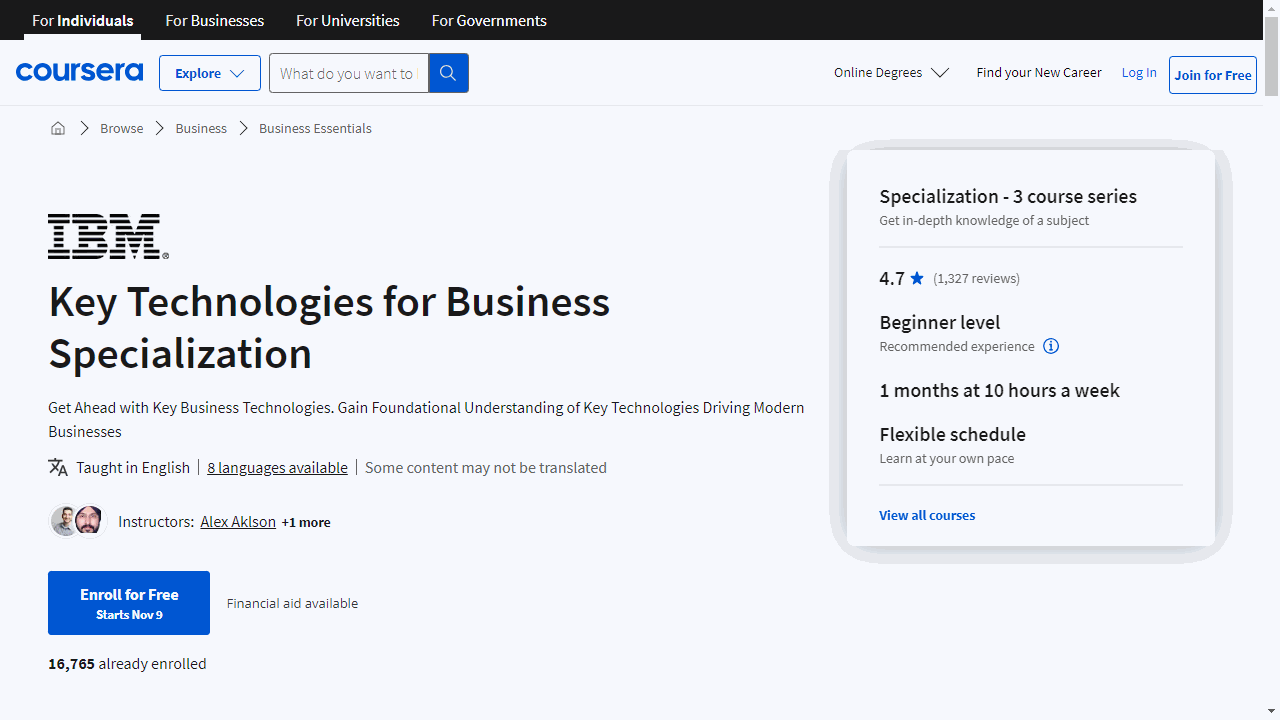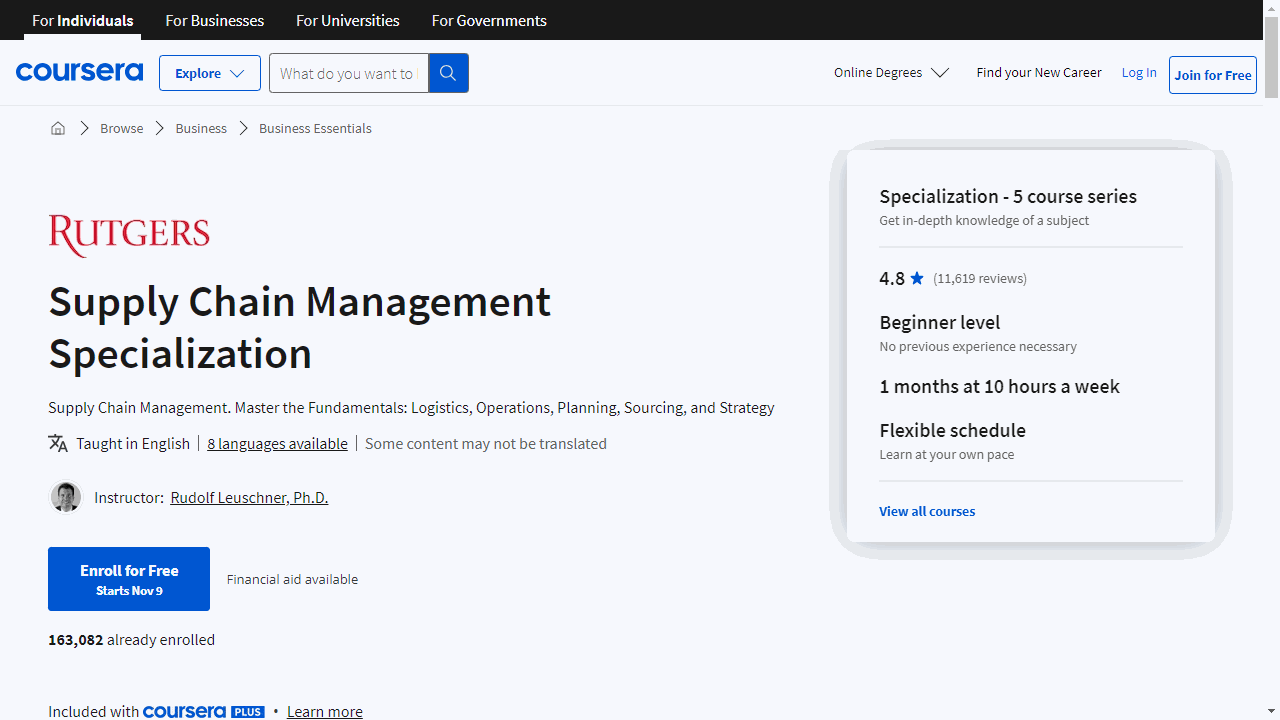Business is a dynamic field that requires a broad understanding of various concepts and skills.
From marketing and finance to operations and strategic management, a solid business foundation is essential for success in today’s competitive environment.
Learning these key principles allows you to make informed decisions, manage resources effectively, and lead your organization towards growth and profitability.
Finding the right business course on Coursera can be challenging, with so many options available.
You’re looking for a program that provides a comprehensive overview of essential business concepts while being engaging and taught by experienced professionals.
You want a course that fits your learning style and helps you achieve your career goals, whether you’re just starting your journey or looking to enhance your existing knowledge.
For the best business course overall on Coursera, we recommend the Wharton Business Foundations Specialization.
This program is taught by renowned faculty from the Wharton School of the University of Pennsylvania, a leading institution known for its excellence in business education.
The specialization covers key areas such as marketing, finance, operations management, and more, providing a strong foundation for anyone looking to build a career in business.
Its comprehensive approach and practical applications make it an excellent choice for both beginners and those with some business experience.
While the Wharton Business Foundations Specialization is our top pick, there are other great options available on Coursera.
Keep reading to explore our recommendations for different learning styles and goals, including courses focused on specific business functions, leadership, and entrepreneurship.
Wharton Business Foundations Specialization
This specialization is a classic choice for anyone looking to build a solid foundation in business. Taken by more than 100,000 learners, it’s a comprehensive learning path that covers key areas such as marketing, finance, and operations management.
Take “Introduction to Marketing,” where you’re not just learning theories but also applying them.
This course, led by Wharton’s esteemed faculty, equips you with an understanding of branding that goes beyond logos to create lasting customer loyalty.
You’ll also explore customer centricity, which is all about truly understanding and meeting customer needs, and you’ll delve into effective go-to-market strategies that are tested before you invest.
When it comes to the numbers, “Introduction to Financial Accounting” has you covered.
It demystifies financial statements, teaching you to read and analyze them with confidence.
This skill is crucial for anyone looking to make informed financial decisions, and the course’s practical approach means you’ll be able to apply what you learn to actual business scenarios.
Managing people is often cited as one of the most challenging aspects of business, but “Managing Social and Human Capital” provides valuable insights into this complex area.
Learn how to motivate and reward performance, design jobs for high productivity, and make timely management decisions. This course offers tools for building a thriving organizational culture.
For those interested in the financial underpinnings of a company, “Introduction to Corporate Finance” introduces key concepts such as the time value of money and risk-return tradeoff.
You’ll see how these ideas play out in various scenarios, from personal finance to corporate decision-making, making the content relevant and applicable.
Efficiency is key in business, and “Introduction to Operations Management” focuses on streamlining processes to improve performance.
You’ll learn to identify bottlenecks, implement process improvements, and manage variability. The course is hands-on, with practical exercises that translate to real-world benefits.
Finally, the “Wharton Business Foundations Capstone” allows you to apply your cumulative knowledge to challenges from established companies.
This project-based course is a chance to synthesize what you’ve learned and demonstrate your ability to think strategically and offer viable solutions.
Overall, the Business Foundations Specialization offers a comprehensive learning experience that balances theoretical knowledge with practical application.
It’s an investment in your business acumen that promises to pay dividends in your professional journey.
Introduction to Business Specialization
Starting with “Essentials of Management and Strategic Planning,” this course is designed to ground you in the fundamentals of effective management.
You’ll explore the differences between management and leadership and learn how to cultivate a team that’s both motivated and productive.
The course also delves into strategic planning, teaching you how to craft strategies that can give your organization a competitive edge.
Next, “Fundamentals of Finance” is ideal for those looking to get a firm grip on financial concepts that impact a company’s performance.
This course demystifies financial statements and introduces you to key concepts like forecasting and budgeting. You’ll learn to manage cash flow and expenses, which are critical skills for maintaining a healthy business.
Lastly, “Introduction to Digital Marketing” brings you up to speed with the latest in online marketing strategies.
As digital presence becomes increasingly crucial for businesses, understanding how to engage customers online is vital.
This course covers essential topics such as SEO, social media engagement, and the power of storytelling in marketing.
You’ll also learn the significance of managing online reviews, a factor that can significantly influence consumer behavior.
Each course is designed to be interactive and applicable, ensuring that you can put your new knowledge to work immediately.
They’re structured to fit into your schedule, allowing you to learn at your own pace and on your own terms.
All with the backing of the University of California, Irvine, a top-ranked US university.
Business Strategy Specialization
Starting with “Foundations of Business Strategy,” you’ll gain a firm grasp of strategic thinking.
This course empowers you to analyze the competitive landscape using proven tools like SWOT and Competitor Analyses.
It’s about laying the groundwork for strategic decision-making, giving you the ability to identify where your firm can truly shine.
Moving on to “Advanced Business Strategy,” you’ll delve into more complex concepts such as corporate strategy and internationalization.
This course helps you understand the nuances of industry dynamics and teaches you how to adapt to various business environments.
It’s an essential guide for anyone looking to navigate the complexities of operating across borders and sectors.
In “Business Growth Strategy,” the focus shifts to expansion and scaling.
You’ll explore different avenues for growth, from entering new markets to driving innovation.
This course also tackles the intricacies of mergers and acquisitions, providing you with the foresight to avoid common pitfalls. It’s a practical approach to growing a business sustainably.
“Strategic Planning and Execution” bridges the gap between theory and practice.
Here, you’ll learn how to translate strategic analysis into actionable plans using the 4A model.
Insights from seasoned professionals add real-world relevance, ensuring you’re prepared to implement strategies effectively. This course is about turning strategic vision into tangible results.
Lastly, the “Business Strategy in Practice (Project-centered Course)” is where you apply your learning.
Through a comprehensive Strategic Analysis project, you’ll demonstrate your ability to conduct research, select the right analytical tools, and communicate your recommendations clearly.
It’s a culmination of your learning journey, showcasing your ability to think and act strategically.
AI For Business Specialization
This series of courses is designed to demystify AI for professionals who aren’t steeped in data science, providing practical insights and tools that can be applied directly to your business.
The specialization kicks off with “AI Fundamentals for Non-Data Scientists.”
This course is a comprehensive introduction to machine learning and big data, tailored for those without a technical background.
You’ll learn to create algorithms using accessible tools like Teachable Machine and TensorFlow, understand the nuances of deep learning, and how to refine your models for better accuracy.
Insights from industry leaders at companies like McDonald’s and Visa bring real-world context to the lessons, ensuring you can apply what you learn to actual business scenarios.
Moving on to “AI Applications in Marketing and Finance,” you’ll discover how AI can enhance customer experiences and extend their engagement with your brand.
The course covers the analysis of consumer behavior, targeting marketing efforts effectively, and improving fraud detection.
It’s a deep dive into the practical applications of AI that can help safeguard customer data and optimize financial operations.
For those interested in the human side of business, “AI Applications in People Management” explores the intersection of AI and HR.
This course covers the entire employee lifecycle, from recruitment to retention, and how machine learning can be leveraged to make informed HR decisions.
You’ll also learn about the importance of data ethics and how to mitigate bias, ensuring your AI solutions are fair and equitable.
Lastly, “AI Strategy and Governance” provides a strategic framework for implementing AI in your business.
You’ll explore how AI can be used to gain a competitive edge, the importance of explainable AI, and how to establish responsible governance practices.
The course also touches on managing organizational change as AI becomes more integrated into business processes.
By the end of the specialization, you’ll have a solid foundation in AI, ready to harness its potential to drive your business forward.
Leading the Modern Day Business Specialization
Navigating the complexities of the modern business landscape requires a robust skill set, and the “Leading the Modern Day Business Specialization”, offered by the University of Virginia on Coursera, teaches a comprehensive toolkit for those eager to excel.
Each course within this specialization is designed to address key areas of business leadership and innovation.
The “Digital Transformation” course demystifies the buzzword by breaking down the economics of innovation and the realities of technology disruptions.
It’s not just about keeping pace with change; it’s about understanding and leveraging it to your advantage.
With insights from the Darden School of Business and the Boston Consulting Group, you’ll learn to apply a strategic framework to digitize your organization effectively.
In “Design Thinking for Innovation,” you’ll discover that innovation isn’t confined to creative industries—it’s a mindset that’s crucial across all sectors.
This course teaches you to harness design thinking to identify and act on opportunities, fostering a culture of innovation wherever you are. It’s about thinking differently and finding solutions that others might miss.
For those interested in the intersection of technology and business, “Digital Product Management: Modern Fundamentals” offers a deep dive into the evolving role of product managers.
You’ll explore how to navigate vast data sets and customer insights to steer your product’s direction.
This course is tailored to those who want to stay ahead in a digital-first environment, providing methods to manage and grow your product portfolio.
Lastly, “Customer-Centric IT Strategy” tackles the high stakes of IT investment.
With a focus on design thinking and agile methodologies, this course equips you to align IT initiatives with broader business objectives.
You’ll learn to use tools like the Business Model Canvas to ensure your IT strategies resonate with stakeholders and deliver value.
Each course stands on its own merit, offering specialized knowledge that can propel you forward in your career.
Together, they form a cohesive learning experience that prepares you to lead with confidence in a digital, design-focused, and customer-oriented business world.
Wharton Business Analytics Specialization
This suite of courses, designed by Wharton’s renowned faculty, equips you with the analytical tools needed to excel in today’s data-centric business environment.
The “Customer Analytics” course is a solid starting point.
It teaches you how to interpret the vast amounts of data generated by customer interactions. You’ll explore methods for collecting and analyzing this information to inform business strategies.
The course doesn’t just stop at theory; it connects concepts to real-world applications at companies like Amazon and Google, giving you a clear picture of how these insights drive business success.
Moving on to “Operations Analytics,” you’ll shift focus to the internal gears of a business.
This course demystifies the process of turning raw data into actionable strategies for supply and demand. It’s designed for those new to analytics, ensuring that even beginners can grasp the concepts and apply them to real-world scenarios.
With “People Analytics,” the human side of business takes center stage.
Here, you’ll learn how to apply data analysis to manage and develop talent effectively. The course reveals techniques used by industry leaders to make informed decisions on hiring, team building, and employee development.
It’s a valuable resource for anyone looking to enhance their HR skills through a data-driven lens.
“Accounting Analytics” bridges the gap between financial data and business performance.
This course goes beyond traditional accounting to show how financial statements and metrics can forecast and influence a company’s direction.
You’ll gain insights into how accounting data can inform areas such as risk management and strategic planning.
Finally, the “Business Analytics Capstone” allows you to apply your newfound knowledge to a practical challenge.
You’ll engage with real data from major tech companies, developing a project that showcases your ability to make informed, data-driven decisions.
This hands-on experience is invaluable, cementing the skills you’ve learned throughout the specialization.
Entrepreneurship Specialization
“Entrepreneurship 1: Developing the Opportunity” is where it all begins.
This course demystifies the concept of entrepreneurship and helps you understand if you have what it takes to be an entrepreneur.
You’ll learn to distinguish a viable business opportunity from a mere idea, test assumptions, and build a prototype.
It’s a practical foundation that sets the stage for your entrepreneurial journey.
As you progress to “Entrepreneurship 2: Launching your Start-Up,” you’ll transition from idea to action.
This course equips you with the tools to establish a scalable business model.
You’ll delve into the lean start-up methodology, learn when to pivot, and understand the intricacies of team management and equity allocation.
It’s about turning your validated idea into a structured business ready to enter the market.
In “Entrepreneurship 3: Growth Strategies,” the focus shifts to expansion. Growth is crucial, but it must be managed wisely.
This course covers key marketing strategies, including digital marketing and SEO, and provides insights into building sales processes and partnerships.
You’ll also explore talent acquisition and retention. It’s designed to help you scale your business effectively.
“Entrepreneurship 4: Financing and Profitability” addresses the financial aspect of running a start-up.
You’ll explore various financing options, understand equity financing, and learn about investor expectations.
This course aims to prepare you for the financial challenges of entrepreneurship and guide you towards a profitable business model.
The “Wharton Entrepreneurship Capstone” is the culmination of your learning experience.
Here, you’ll apply everything you’ve learned by creating a pitch deck for a new venture.
You’ll receive peer feedback and practice evaluating pitches, gaining a perspective on what investors look for in potential investments.
Each course is designed to build on the previous one, ensuring a logical progression of skills and knowledge.
You’ll gain insights into venture capital, strategic management, and more, all while learning from experienced entrepreneurs and business experts.
Excel Skills for Business Specialization
Starting with “Excel Skills for Business: Essentials,” you’ll learn to maneuver through the Excel interface, perform calculations, and present data through charts and graphs.
The course emphasizes practical application, offering you the chance to tackle real business problems with downloadable workbooks and full data sets.
Next, “Excel Skills for Business: Intermediate I” builds upon your foundational knowledge.
Here, you’ll learn to manage larger datasets and generate meaningful reports. The course introduces a layer of automation to streamline your tasks, saving you time and effort.
Through the narrative of Uma at PushPin, you’ll see these skills in action, making the learning process relatable and applicable.
As you progress to “Excel Skills for Business: Intermediate II,” the focus shifts to error prevention, advanced automation, and complex formulas.
These skills are crucial for informed decision-making and data forecasting. The course content is delivered with guidance from a team of instructors, ensuring you have support as you tackle more challenging concepts.
Lastly, “Excel Skills for Business: Advanced” is where you’ll polish your skills to a professional level.
This course covers advanced formula techniques, data preparation for analysis, and the creation of professional dashboards. You’ll have a comprehensive skill set that can significantly enhance your work quality and efficiency.
Each course in the specialization is designed to be interactive and engaging, with a focus on real-world application.
By the end of the specialization, you’ll not only understand Excel better but also be able to leverage its features to improve your business processes.
International Business Essentials Specialization
The specialization begins with “Professional Skills for International Business,” where you’ll hone the essential soft skills that make a lasting impact in any professional setting.
From crafting a compelling personal brand to mastering the nuances of effective leadership and time management, this course lays the groundwork for your ascent in the business world.
As you progress to “Management Skills for International Business,” the focus shifts to the intricacies of leadership versus management.
Here, you’ll delve into what truly motivates teams and learn how to foster productive relationships, setting you apart as a leader who not only manages but inspires.
For those with an affinity for numbers, “Quantitative Foundations for International Business” strengthens your mathematical foundation, a critical aspect for anyone aiming to excel in finance or economics.
The course offers a practical approach to complex concepts, ensuring you’re well-prepared for analytical challenges.
Complementing this is “Statistics for International Business,” which demystifies the process of interpreting data to make informed decisions.
Understanding probability and statistical estimation becomes second nature, empowering you to navigate the data-centric aspects of modern business with ease.
To contextualize your newfound skills, “International Business Environment” provides a strategic lens through which to view the global market.
You’ll explore various analytical frameworks, such as PESTLE and SWOT, to assess and adapt to the ever-changing international business landscape.
Culminating the specialization is the “International Business Capstone,” a practical application of all the knowledge you’ve accumulated.
This project simulates real-world business challenges, allowing you to craft a comprehensive business plan that could serve as a cornerstone for your future endeavors.
Each course not only contributes to your professional development but also serves as a potential stepping stone towards the University of London’s Global MBA program.
Business Strategies for A Better World Specialization
The course “Global Trends for Business and Society” is where you start to understand the forces shaping our world.
Taught by Professor Mauro Guillen from the Wharton School, it offers a practical approach to trend analysis, helping you anticipate and adapt to global shifts.
You’ll explore how these trends impact everything from consumer behavior to geopolitical relationships, preparing you to make strategic decisions with a global perspective.
Moving on to “Corruption,” this course tackles a tough but necessary subject.
It’s about understanding the underbelly of global affairs and the importance of integrity in business practices.
You’ll delve into the causes and consequences of corruption, gaining insights that could help you navigate and combat unethical practices in your career.
For those driven by a mission to solve societal challenges, “Social Entrepreneurship” is your guide to making a tangible difference.
Professors James Thompson and Ian “Mac” MacMillan will mentor you through the process of creating a social enterprise, from identifying a problem to planning its execution.
This course is designed to transform your passion for change into actionable, sustainable solutions.
Lastly, “Business Strategies for Social Impact” bridges the gap between profit and purpose.
Professors Katherine Klein and Chris Geczy introduce you to the world of impact investing and teach you how to craft business strategies that contribute to societal well-being.
You’ll learn to lead with vision and implement practices that not only benefit your organization but also make a positive mark on the world.
Each course in this specialization provides a piece of the puzzle, helping you to see the bigger picture of business’s role in society.
You’ll gain a comprehensive understanding of how to align business acumen with social responsibility, setting you apart in today’s competitive landscape.
University of Illinois Business Analytics Specialization
The specialization kicks off with “Introduction to Business Analytics with R,” where you’ll learn to master data processing using R and RStudio.
This course isn’t just about programming; it’s about understanding the synergy between business operations and data analytics, and how to streamline the process to make data work for you.
Moving on, “Introduction to Business Analytics: Communicating with Data” teaches you the importance of data storytelling.
You’ll learn to choose the right analytic tools and present data in a way that informs and influences business decisions. It’s about making data understandable and actionable for everyone in your organization.
In “Tools for Exploratory Data Analysis in Business,” you’ll cultivate an analytic mindset, essential for identifying and solving business problems.
You’ll get hands-on experience with PowerBI, Alteryx, and RStudio, learning to conduct exploratory data analysis that can reveal hidden opportunities and inform strategy.
For those intrigued by predictive analytics, “Machine Learning Algorithms with R in Business Analytics” offers a deep dive into the world of machine learning.
You’ll understand when and how to apply different algorithms using R, and how to interpret the results to make informed business decisions.
“Applying Data Analytics in Marketing” is tailored for those with a keen interest in marketing.
This course covers a range of analytical tools that help you understand customer behavior and satisfaction, ensuring that your marketing strategies are data-driven and effective.
Lastly, “Applying Data Analytics in Accounting” brings a technological edge to traditional accounting practices.
You’ll explore innovative topics like blockchain and process mining, and learn to apply text analysis and robotic process automation to accounting tasks using tools like R, Alteryx, and UiPath.
Managerial Economics and Business Analysis Specialization
This specialization, offered by the esteemed Gies College of Business, equips you with the analytical tools necessary for astute business decision-making.
The course “Firm Level Economics: Consumer and Producer Behavior” delves into the intricacies of market dynamics.
You’ll gain a clear understanding of how prices influence consumer and producer choices, and how these interactions determine market equilibrium.
The concepts of demand elasticity and cost theory are broken down, providing you with a solid foundation to analyze business constraints and pricing strategies.
Moving on, “Firm Level Economics: Markets and Allocations” expands on market structures and the role of government intervention.
You’ll learn to model the effects of external shocks on markets and assess the efficiency of different economic systems.
This course also addresses market failures and the optimal government responses, enhancing your ability to navigate complex market conditions.
Data is the lifeblood of modern business, and “Exploring and Producing Data for Business Decision Making” teaches you to harness it effectively.
You’ll become proficient in summarizing and interpreting data, understanding the importance of sampling, and applying statistical concepts using Excel.
These skills are crucial for making informed business decisions in an uncertain world.
“Inferential and Predictive Statistics for Business” further develops your statistical acumen.
It focuses on hypothesis testing, comparing population metrics, and employing linear regression for forecasting.
The course emphasizes practical application, particularly through Excel, ensuring that you can apply these statistical methods directly to real-world business scenarios.
For those with an interest in finance, “Banking and Financial Institutions” offers a deep dive into the sector’s inner workings.
You’ll explore the structure of financial institutions, the services they offer, and the evolving landscape of financial regulation.
This course provides a conceptual framework to understand how financial innovations and regulations impact the economy.
Lastly, “Central Banks and Monetary Policy” demystifies the role of central banks in shaping economic policy.
You’ll grasp the relationships between interest rates, inflation, and unemployment, and learn to interpret how central bank decisions affect financial markets and the broader economy.
Each course in this specialization builds upon the last, culminating in a well-rounded understanding of managerial economics and business analysis.
The skills you acquire are not only theoretical but also practical, with a strong emphasis on real-world application, particularly through the use of Excel for data analysis.
Key Technologies for Business Specialization
The “Introduction to Cloud Computing” course is an excellent starting point.
It’s designed to demystify the cloud for beginners, covering everything from basic concepts to the intricacies of various service models like IaaS, PaaS, and SaaS.
You’ll also get acquainted with major cloud providers, which is crucial knowledge in today’s market.
The course includes practical labs and a final project that not only solidify your learning but also enhance your portfolio, making you a more attractive candidate in the job market.
Shifting focus to AI, the “Introduction to Artificial Intelligence (AI)” course breaks down complex ideas into digestible pieces.
You’ll explore AI’s transformative role across industries without getting bogged down by technical jargon.
The course addresses the societal impacts of AI, such as ethics and job displacement, providing a well-rounded perspective.
Completing a mini-project allows you to apply what you’ve learned, giving you a taste of AI in action.
Lastly, “What is Data Science?” answers precisely that question, positioning data science as a critical field in the modern data-driven environment.
The course offers a glimpse into the work of data scientists and the impact of their discoveries.
You’ll learn why data science skills are in high demand and how they’re applied in business contexts. Insights from professionals in the field add a layer of depth to the learning experience.
Each course in this specialization is crafted to be accessible, focusing on imparting practical knowledge and skills rather than overwhelming you with technical details.
Supply Chain Management Specialization
This series of courses is designed to equip you with the essential skills needed to navigate and optimize the supply chain, a critical component of any business operation.
The journey begins with “Supply Chain Logistics,” where you’ll gain insight into the delivery of goods from origin to consumer.
This course breaks down the logistics landscape, covering transportation, warehousing, and inventory.
You’ll learn to evaluate transportation options, design efficient warehouses, and manage inventory effectively.
This foundational course is accessible even if you’re new to the field, though a basic grasp of business concepts will help you hit the ground running.
Moving on to “Supply Chain Operations,” you’ll delve into the processes that ensure consistent production quality.
The course introduces you to Six Sigma and Lean methodologies, empowering you to identify and eliminate waste, thereby enhancing operational efficiency.
A familiarity with spreadsheets and the concepts from the logistics course will serve you well here.
In “Supply Chain Planning,” the focus shifts to the art of balancing supply with demand.
You’ll master various forecasting methods to inform a Sales and Operations Plan, ensuring that production levels are in tune with market needs.
This course is particularly valuable for those looking to avoid the pitfalls of overproduction or stock shortages.
“Supply Chain Sourcing” takes you into the realm of supplier management.
You’ll learn to navigate the supplier selection process and develop strategies for effective supplier segmentation.
You’ll be equipped to establish and maintain productive relationships with suppliers, a key aspect of any robust supply chain.
The specialization culminates with “Supply Chain Management Strategy,” a capstone course that challenges you to apply your newfound knowledge to real-world scenarios.
Here, you’ll demonstrate your ability to craft comprehensive supply chain strategies, integrating the tools and techniques from the preceding courses.
From forecasting and strategic sourcing to risk management, you’ll emerge with a well-rounded understanding of how to make a supply chain efficient and responsive.
